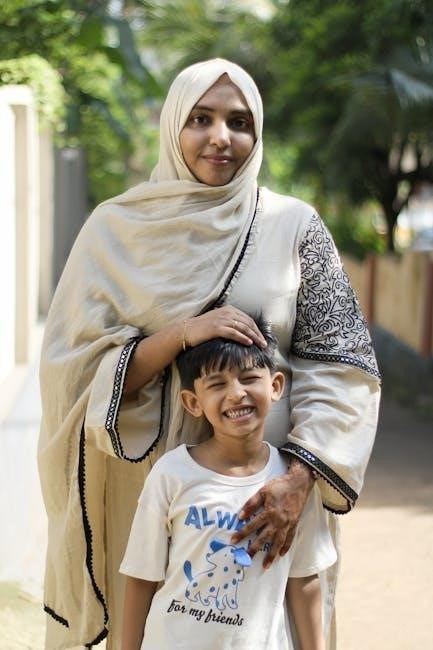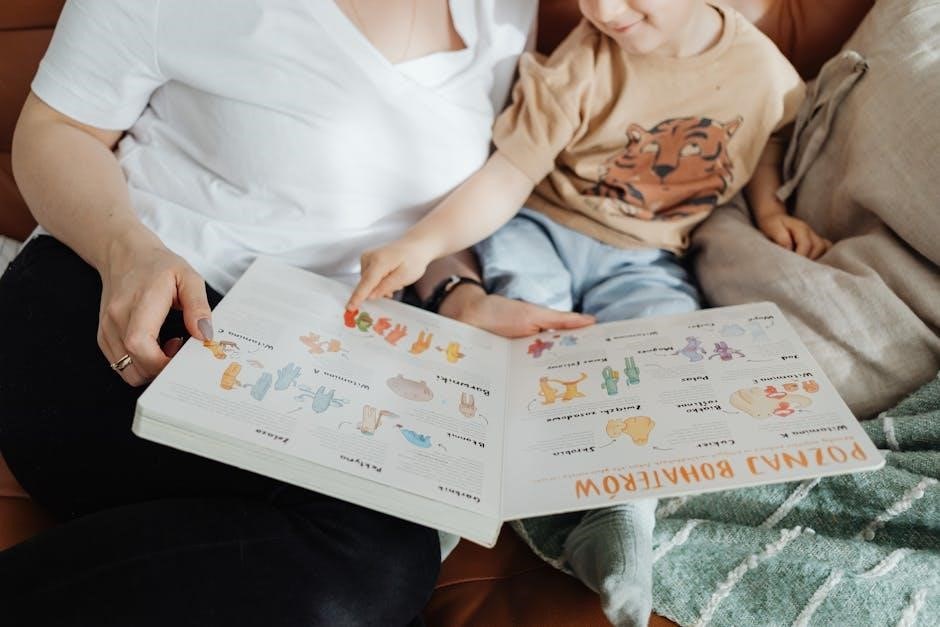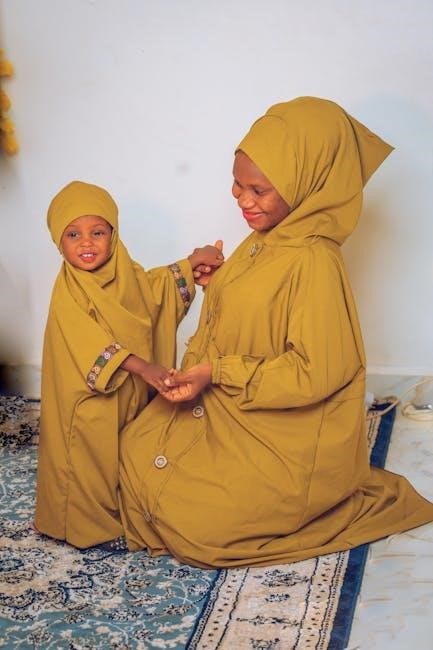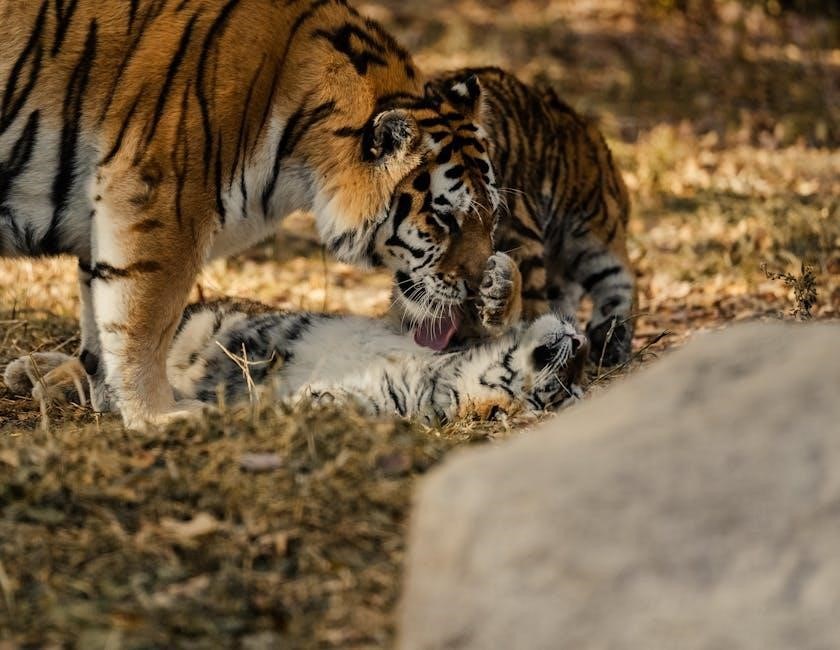Amy Chua’s controversial memoir, The Battle Hymn of the Tiger Mother, explores her experiences raising her children with strict, traditional Chinese parenting methods, sparking debates on cultural differences in child-rearing.
1.1 Background of the Book
The Battle Hymn of the Tiger Mother is a memoir by Amy Chua, first published in 2011 by Penguin Publishing Group. The book chronicles Chua’s experiences raising her two daughters, Sophia and Lulu, using strict, traditional Chinese parenting methods. Chua, a Yale law professor, contrasts these methods with Western parenting styles, emphasizing high expectations, rigorous academic and musical training, and a demanding approach to achievement. The book sparked significant controversy and debate, with some praising its honesty and others criticizing its perceived harshness. Chua argues that the “tiger mother” approach, rooted in her own upbringing, is designed to cultivate resilience and success in her children. The memoir includes anecdotes about her daughters’ achievements, such as performing at Carnegie Hall, as well as the challenges and conflicts that arose. The book has been widely discussed in popular culture and parenting circles, making it a pivotal work in the conversation about cultural differences in child-rearing.
1.2 Main Arguments and Themes
Amy Chua’s The Battle Hymn of the Tiger Mother presents a compelling exploration of cultural parenting differences, arguing that the traditional Chinese approach yields high-achieving children. She contends that Western parents often prioritize self-esteem over accomplishment, while Chinese parents emphasize effort and results. The book highlights themes of sacrifice, discipline, and the pursuit of excellence, showcasing how Chua pushed her daughters to excel academically and musically. She argues that the “tiger mother” method, though demanding, prepares children for future challenges. However, she also acknowledges the emotional toll and criticism she faced, revealing a nuanced perspective on parenting. The memoir underscores the tension between cultural values and modern parenting practices, provoking readers to reflect on their own approaches to raising children.

1.3 Book Structure and Organization
The Battle Hymn of the Tiger Mother is structured as a memoir, blending personal anecdotes with broader reflections on parenting. The book is divided into chapters that chronicle Chua’s experiences raising her two daughters, Sophie and Lulu, while contrasting her approach with Western parenting norms. Each chapter highlights specific events, such as forcing her daughter to practice piano despite a high fever, to illustrate her strict, demanding methods. The narrative also delves into Chua’s own upbringing, drawing parallels between her parents’ influence and her decisions as a mother. The book concludes with a reflection on the challenges and criticisms she faced, including her daughters’ reactions to her parenting style. Additionally, the memoir includes acknowledgments and a list of sources, providing context for her arguments. The structure ensures a balanced mix of storytelling and analysis, making the book both personal and thought-provoking.

Author Background
Amy Chua, a Yale law professor, gained prominence with her 2011 memoir, Battle Hymn of the Tiger Mother, exploring her strict parenting style rooted in her Chinese heritage, sparking global debates on parenting practices.
2.1 Amy Chua’s Personal History
Amy Chua was born in 1962 in Champaign, Illinois, to Chinese immigrant parents. Her father, Leon Chua, was an engineer, and her mother, Dorothy Chua, was a homemaker. Growing up in a traditional Chinese household, Chua experienced the strict, demanding parenting style that she would later adopt with her own children. She attended Harvard University, where she studied economics and later earned her law degree from Harvard Law School. Chua became a professor at Yale Law School, specializing in international business and law. Her personal experiences as a first-generation American and her upbringing deeply influenced her views on parenting, which she chronicled in The Battle Hymn of the Tiger Mother. Chua is married to Jed Rubenfeld, a fellow Yale Law professor, and they have two daughters, Sophia and Lulu, whose upbringing is central to her memoir.
2.2 Academic and Professional Credentials
Amy Chua holds a distinguished academic and professional background. She graduated magna cum laude from Harvard University with a degree in economics and later earned her Juris Doctor from Harvard Law School. Chua joined Yale Law School as a professor, where she specializes in international law, business, and human rights. Her academic work has been widely recognized, and she has authored several influential books before The Battle Hymn of the Tiger Mother. Chua’s expertise in law and global affairs has earned her numerous accolades, solidifying her reputation as a leading voice in her field. Her professional achievements and scholarly contributions provide a foundation for her insights into cultural and parenting practices, which she explores in her memoir.
2.3 Motivations for Writing the Book
Amy Chua was motivated to write The Battle Hymn of the Tiger Mother to share her personal journey of raising her children using traditional Chinese parenting methods. She aimed to challenge the conventional Western approach to parenting, which she believed was too permissive. Chua sought to highlight the cultural differences in child-rearing practices and the values she believed were essential for her children’s success. By chronicling her experiences, she hoped to provoke a broader conversation about parenting styles and their impact on children’s outcomes. Additionally, Chua wanted to address the misunderstandings surrounding Asian-American parenting and provide a nuanced perspective on the sacrifices and challenges faced by immigrant parents. Through her memoir, she aspired to inspire parents to reflect on their own approaches while offering a candid look at the rewards and costs of her unconventional methods.
Key Themes Explored

Amy Chua’s memoir delves into cultural parenting differences, the intense demands of the “Tiger Mother” approach, and the complex role of mothers in shaping their children’s identities and achievements through strict discipline and high expectations.
3.1 Cultural Differences in Parenting
The Battle Hymn of the Tiger Mother vividly highlights the stark contrasts between Eastern and Western parenting styles. Amy Chua, a Chinese-American mother, details her strict, demanding approach, emphasizing academic excellence, musical mastery, and filial loyalty, which she contrasts with the more permissive Western style. The book sparks intense debates about cultural attitudes toward childhood, success, and parental expectations, revealing how these differences shape children’s identities and achievements.
3.2 The Concept of the Tiger Mother
The Tiger Mother embodies a parenting archetype rooted in Chinese culture, symbolizing strength, authority, and high expectations. Amy Chua popularized this concept in her memoir, describing a mother who demands excellence, often through strict discipline and sacrifice. The Tiger Mother prioritizes academic and extracurricular achievements, pushing children to surpass their peers. While critics argue this approach can be harsh, Chua defends it as a way to build resilience and ensure success in a competitive world. The concept has sparked global debate, with some praising its effectiveness and others criticizing its potential emotional toll. The Tiger Mother represents a cultural ideal of maternal devotion and high standards, challenging Western notions of parenting and childhood. This concept has become a focal point in discussions about parenting styles and their impact on children’s lives.
3.3 The Role of the Mother in Child-Rearing
In The Battle Hymn of the Tiger Mother, Amy Chua portrays the mother as a central figure in child-rearing, emphasizing her role as a driving force for excellence. The mother is depicted as a strict disciplinarian, sacrificing personal comfort to ensure her children’s success. Chua’s narrative highlights the mother’s unwavering dedication, often manifesting as high expectations, rigorous practice schedules, and intense oversight of academic and extracurricular activities. While this approach is criticized for its severity, it underscores the cultural belief that a mother’s role is to prepare her children for a competitive world by fostering resilience and achievement. The book illustrates how the mother’s influence shapes the children’s identity, values, and future prospects, reflecting a deep-seated commitment to their upbringing. This portrayal challenges Western parenting norms, offering a contrasting perspective on maternal involvement and its impact on child development. Through her experiences, Chua explores the complexities and challenges of this role, making it a central theme of her memoir.
Reception and Criticism
The Battle Hymn of the Tiger Mother sparked intense debate, with some praising its honesty and cultural insights, while others criticized its extreme parenting methods, calling them harmful and culturally rigid.
4.1 Positive Reviews and Support
The Battle Hymn of the Tiger Mother received significant praise for its unflinching honesty and insightful exploration of cultural differences in parenting. Many readers admired Amy Chua’s courage in sharing her unconventional approach, which emphasized high expectations, rigorous discipline, and a belief in her children’s potential. The book was lauded for its engaging narrative style, blending humor with poignant reflections on the challenges of blending cultural identities. Supporters argued that Chua’s methods, though controversial, were rooted in love and a desire for her children’s success. The memoir also sparked important conversations about parenting styles and the pressures faced by immigrant families. While some critics found her approach extreme, many appreciated the book’s ability to provoke thought and challenge traditional Western parenting norms. Overall, the book was celebrated for its raw honesty and its contribution to a broader dialogue about child-rearing and cultural values.
4.2 Negative Backlash and Criticisms
Amy Chua’s The Battle Hymn of the Tiger Mother faced intense criticism for its portrayal of strict parenting. Critics accused Chua of promoting an emotionally abusive approach, citing examples of harsh discipline and unrealistic expectations. Many argued that her methods, such as denying her children basic freedoms and using fear as a motivator, could lead to psychological harm; The book was also criticized for generalizing Asian parenting practices, reinforcing stereotypes about Asian parents being overly demanding. Some readers felt that Chua’s narrative lacked empathy and dismissed the emotional well-being of her children. Additionally, the book’s release sparked a broader debate about the validity of extreme parenting styles, with many questioning whether high academic achievement justified the potential emotional costs. The backlash was further amplified by media coverage, which often sensationalized Chua’s methods, leading to widespread public condemnation and labeling her as an extreme parent. Despite this, Chua maintained that her approach was motivated by love and a desire for her children’s success.
4.3 Cultural Impact and Discussions
The Battle Hymn of the Tiger Mother ignited a global conversation about parenting styles and cultural values. Amy Chua’s controversial approach highlighted differences between Western and Asian parenting, sparking debates on whether strict, achievement-focused methods are harmful or beneficial. The book became a cultural phenomenon, prompting discussions in media, academia, and households worldwide. It challenged Western norms of permissive parenting and questioned the balance between discipline and freedom. Many praised Chua for challenging conventional wisdom, while others criticized her for reinforcing stereotypes about Asian parents. The book also inspired a wave of reflection among parents, educators, and policymakers, leading to a deeper exploration of how cultural identity shapes child-rearing practices. Its impact extended beyond literature, influencing public discourse on education, family dynamics, and cultural diversity. The debates it sparked continue to resonate, making it a defining work in contemporary discussions about parenting and culture.

Book Content Overview
The book is a memoir blending personal anecdotes with cultural commentary, detailing Chua’s strict parenting methods, her daughters’ responses, and the broader implications of cultural differences in child-rearing practices.
5.1 Narrative Style and Tone
Amy Chua’s Battle Hymn of the Tiger Mother is written in a direct, unapologetic, and often humorous tone, blending personal anecdotes with cultural commentary. The narrative is deeply introspective, offering a candid look at Chua’s parenting philosophy and its impact on her daughters. Her style is assertive and unflinching, as she defends her approach while acknowledging its challenges. The book balances lighthearted moments, such as her daughters’ responses to her demands, with intense discussions of cultural identity and parenting ideals. Chua’s voice is both relatable and provocative, making the memoir engaging and thought-provoking. The tone shifts between confidence and vulnerability, showcasing her unwavering belief in her methods alongside moments of doubt. This blend of humor, honesty, and cultural insight creates a compelling narrative that has sparked widespread debate about parenting styles and cultural expectations. The book’s controversial nature is amplified by Chua’s straightforward approach, which challenges readers to reflect on their own beliefs about raising children.
5.2 Key Events and Anecdotes
Battle Hymn of the Tiger Mother is filled with vivid anecdotes that illustrate Amy Chua’s parenting philosophy. One notable event is her younger daughter Lulu’s resistance to playing the violin, which led to a dramatic breakdown. Chua recalls how she pushed Lulu relentlessly, demanding perfection, even in the face of her daughter’s frustration. Another significant anecdote involves Chua’s older daughter, Sophia, who was forced to rewrite a school essay repeatedly until it met her mother’s high standards. These stories highlight Chua’s belief in the importance of hard work and achievement. Additionally, Chua shares moments of cultural conflict, such as when her daughters challenged her strict rules, leading to tense family dynamics. These events not only showcase her parenting style but also reveal the emotional toll it took on her children. Through these anecdotes, Chua provides a raw and unfiltered look at the highs and lows of her approach to raising her daughters.
5.3 The Role of Children in the Story
The children in Battle Hymn of the Tiger Mother are central to the narrative, serving as both subjects and catalysts for Amy Chua’s reflections on parenting. Her daughters, Sophia and Lulu, embody the tensions between Chua’s traditional Chinese upbringing and modern Western influences. Sophia, the elder, often complies with her mother’s demands, achieving academic and musical success, while Lulu rebels against the strict expectations, leading to clashes. Through their experiences, Chua explores the emotional and psychological impacts of her parenting style, revealing moments of pride, conflict, and eventual understanding. The children’s voices emerge indirectly, offering a counterpoint to Chua’s perspective. Their roles highlight the challenges of cultural identity and the pursuit of excellence, making them pivotal in illustrating the broader themes of the book. The narrative ultimately portrays the children as dynamic individuals shaped by their mother’s unwavering dedication and their own resilience.
Legacy and Influence
Battle Hymn of the Tiger Mother sparked intense debates on parenting styles, influencing discussions on cultural differences in child-rearing. Its impact lingers in pop culture references and ongoing conversations about parenting approaches worldwide.
6.1 Impact on Parenting Discourse
Battle Hymn of the Tiger Mother significantly influenced parenting discourse by challenging Western norms. Amy Chua’s strict, achievement-focused approach, rooted in Chinese tradition, sparked debates about the benefits and drawbacks of such methods. Critics argued it could lead to pressure and mental health issues, while supporters praised its emphasis on resilience and excellence; The book became a cultural touchstone, prompting parents to reflect on their own strategies and societal expectations. Its impact extended beyond individual households, inspiring broader conversations about cultural identity, education, and child development. The discourse continues, with many referencing Chua’s ideas in discussions about modern parenting challenges and the balance between nurturing and pushing children to succeed.
6.2 References in Pop Culture
Battle Hymn of the Tiger Mother has become a cultural phenomenon, frequently referenced in media and popular culture. The term “Tiger Mother” is now synonymous with strict, high-expectation parenting, often used humorously or critically in TV shows, movies, and music. Shows like The Simpsons and Saturday Night Live have parodied the concept, highlighting its polarizing nature. The book’s themes have also inspired memes and viral content, cementing its place in modern cultural discourse. Additionally, the term is often invoked in discussions about education, parenting, and cultural identity, making it a go-to reference for commentators and creators alike. Its influence extends beyond literature, reflecting its broader societal impact and the enduring fascination with Chua’s unapologetic approach to parenting; As a result, Battle Hymn of the Tiger Mother remains a significant cultural touchstone, shaping how people discuss and understand parenting styles today.
6.3 Long-Term Effects on Parenting Styles
Battle Hymn of the Tiger Mother has had a lasting impact on parenting styles, sparking intense debates about the merits of strict, high-expectation parenting. Many parents have adopted elements of Chua’s approach, emphasizing achievement and discipline, while others have pushed back, advocating for more nurturing and emotionally supportive methods. The book has influenced cultural conversations about parenting, particularly in Asian-American communities, where some have embraced their heritage’s emphasis on hard work, while others have rejected the Tiger Mother model as overly harsh. Additionally, the memoir has inspired parents to reevaluate their strategies, balancing high standards with emotional support. While some critics argue that Chua’s methods can lead to anxiety and rebellion, others praise her for challenging Western parenting norms. Overall, the book has reshaped how many parents think about raising children, encouraging a more intentional approach to their roles. Its influence continues to be felt, making it a pivotal work in modern parenting discourse.

Availability and Access
The Battle Hymn of the Tiger Mother is widely available in paperback, e-book, and audiobook formats. The PDF version can be downloaded from various online platforms, including PDF Room and other digital libraries, ensuring easy access for readers worldwide.

7.1 Publication Details and Editions
The Battle Hymn of the Tiger Mother was first published in 2011 by Penguin Publishing Group. The book spans 235 pages and includes bibliographical references. It is available in multiple editions, including hardcover, paperback, and digital formats. The ISBN for the paperback edition is 978-1-59420-284-1. Since its release, the book has been widely distributed and remains popular in both physical and e-book formats. The PDF version is accessible through various online platforms, such as PDF Room and other digital libraries, making it convenient for readers to access the content. The book’s availability in multiple formats ensures that it reaches a broad audience, contributing to its enduring relevance in discussions about parenting and cultural differences. Its publication details highlight its widespread accessibility, catering to readers who prefer traditional print or modern digital formats. This versatility has played a significant role in its continued popularity and impact on parenting discourse.
7.2 Availability in PDF Format
The digital version of The Battle Hymn of the Tiger Mother is widely available in PDF format, offering readers a convenient way to access Amy Chua’s thought-provoking memoir. The PDF version can be downloaded from platforms like PDF Room, where it is listed as a free resource. Additionally, various online libraries and e-book retailers provide instant access to the PDF, ensuring that readers can easily obtain the book without the need for physical copies. The PDF format preserves the original content’s integrity, including the bibliographical references and the book’s structure. This accessibility has made the PDF version particularly popular among students and researchers interested in parenting styles and cultural studies. Furthermore, the PDF’s availability has contributed to the book’s enduring presence in academic and public discussions, allowing readers to engage with Chua’s arguments and reflections effortlessly. This ease of access has further amplified the book’s impact and reach, making it a readily accessible resource for anyone exploring the themes of parenting and cultural identity.
7.4 Reading the Book Online
Reading The Battle Hymn of the Tiger Mother online is a convenient option for those who prefer digital formats. The book is available in PDF format, making it accessible via various online platforms and e-book retailers. This digital access allows readers to engage with Amy Chua’s memoir on devices like smartphones, tablets, and laptops, providing flexibility and ease of use. The online version preserves the original content, including the book’s structure and references, ensuring an uninterrupted reading experience.
The PDF format has proven particularly popular among readers who value portability and the ability to highlight or annotate sections. Additionally, online access has made the book more widely available, contributing to its ongoing relevance in discussions about parenting styles and cultural differences. This convenience has also encouraged a broader audience to explore Chua’s insights, further cementing the book’s influence in modern discourse on child-rearing and cultural identity.

No Responses